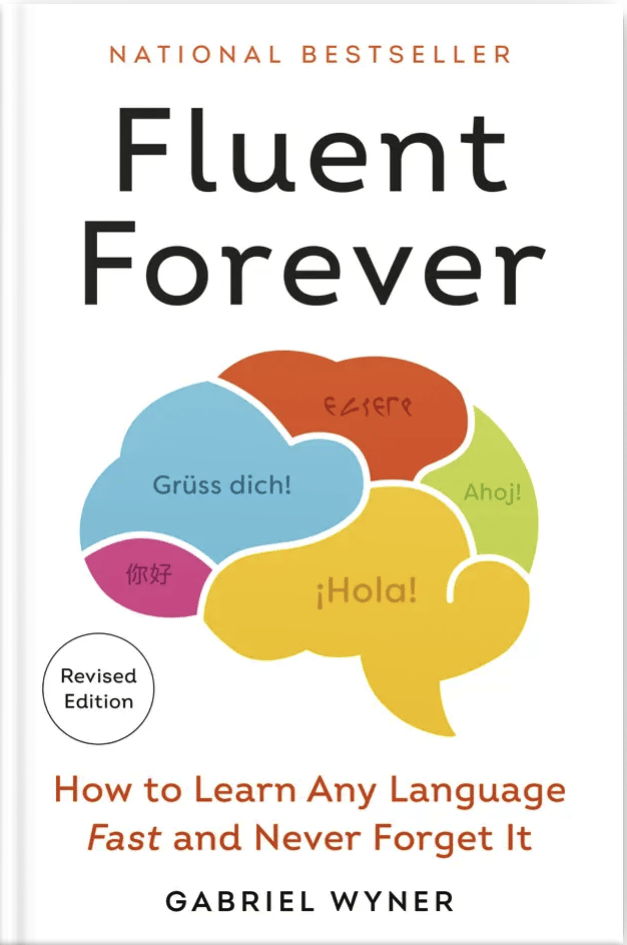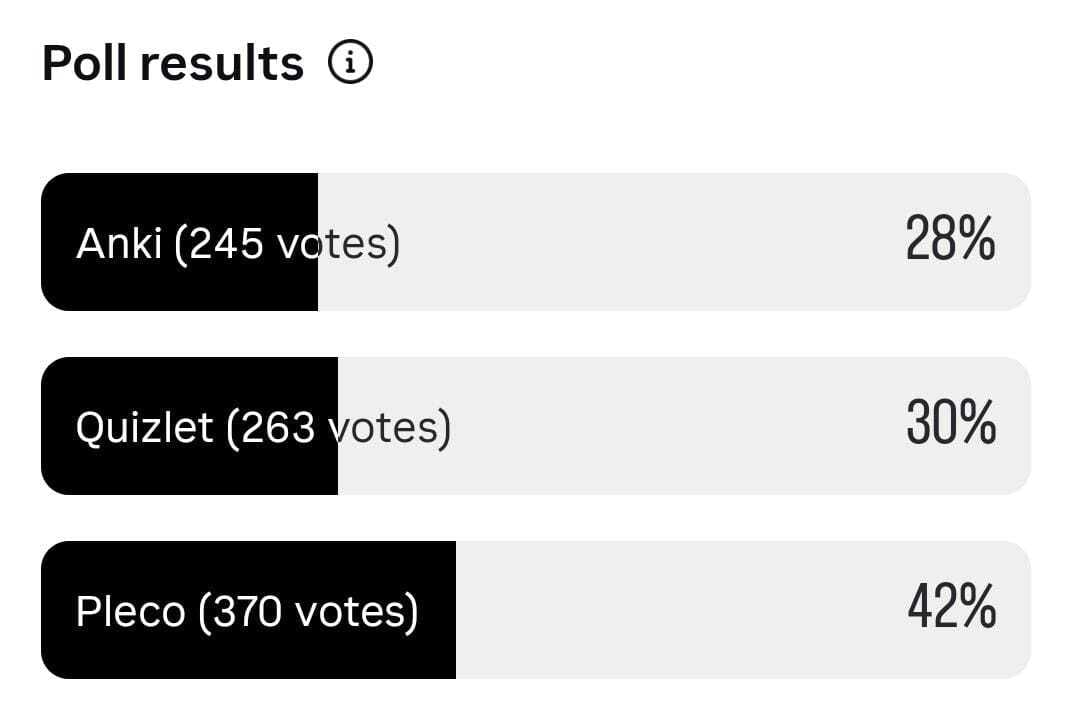- Sandy Cheng 🇨🇳
- Posts
- Pleco, Anki or Quizlet: Which app should you use?
Pleco, Anki or Quizlet: Which app should you use?
The SRS (Spaced Repetition System)
Gabriel Wyner's Fluent Forever is one of the most popular books on language learning. A revised edition came out last December, and since I still haven’t read the original, I figured it was finally time to give it a go. The book is packed with practical tips and insights that can really change the way you approach learning a new language. I do recommend reading it, but I’ll also be sharing some of its key ideas here, starting today and over the next few weeks, and talking about how you can apply them to learning Chinese.

The SRS (Spaced Repetition System)
The main idea in this book is that you should study a new language using a flashcard-based app that uses a Spaced Repetition System (SRS from now on). Before I go into which apps you could use for learning Chinese with this system, let me first tell you what it’s all about.
The SRS is basically designed to bring a word or piece of information back to you right at the moment you're just about to forget it. By doing this again and again at carefully timed intervals, the word gets pushed deeper into your long-term memory. It's a smart and efficient way to make things stick without having to constantly cram or review everything all the time. It is considered to be one of the most effective ways to speed up memorization.
You can use an SRS with your own handmade flashcards if you enjoy the old-school approach (and the book goes into details on how you should create those flashcards), but the more convenient option is to use one of the many flashcard apps out there that already have this system built in. These apps do all the scheduling for you, so you can just focus on learning and reviewing when it's most effective.
So, which Chinese learning apps actually have SRS built in?
Pleco, Anki or Quizlet?
Last week, I posted a poll on my Instagram asking which of these three flashcard-based apps you use to learn Chinese. Here’s what you said:

Pleco won the vote with 42% of you saying that it is your preferred app, while Quizlet and Anki came in second and third with almost the same number of votes. Some of you said you use all 3 and a few of you use different apps, such as HackChinese or BoostChinese. But do all of these use SRS? Which one is the best to use?
Anki
If you’ve read the book, you’ll know that the author recommends using Anki. It has a full SRS system and lets you create highly customizable flashcards, or download pre-made ones if you prefer. It’s completely free to use on your computer (Mac and Windows) or Android device, but if you’re on an iPhone, it does come with a one-time cost (currently $24.99). If you’re looking for a fully customizable experience and probably the most powerful SRS system out there, Anki is a great choice. That said, it does have a steeper learning curve than some of the other apps, which might explain why it only got 28% of your votes.
Pleco
What about Pleco?
Pleco is, first and foremost, an excellent dictionary app, and honestly, it’s a must-have if you’re learning Chinese. You won’t find a better offline Chinese-English dictionary out there. But it’s more than just a dictionary. It also comes with a built-in flashcard testing system, which I’ve written about in more detail here.
My husband actually used this system to prepare for all of his HSK exams, and he passed every single one on the first try (and trust me, he’s pretty lazy!).
But is this system based on SRS? Unfortunately, no. Still, as you can see, it worked really well for him, and since most of you already use Pleco, there’s no reason to stop just because it’s not SRS-based.
Here’s the good news: Pleco does offer an SRS add-on for around $10. If you're serious about long-term vocabulary retention, it's definitely worth considering.
There is one drawback though. Pleco doesn’t support adding images to flashcards. According to Gabriel Wyner, images play a key role in speeding up memorization. So if visual learning is important to you, Anki might be the better choice.
That said, you definitely shouldn’t ditch Pleco. Its dictionary is still the best out there, and it’s an essential tool for any Chinese learner.
Quizlet
Quizlet is one of the easiest flashcard tools to use. You can quickly create your own sets, or use ones shared by others (like me😀), and the app works well whether you're on your computer or just reviewing on your phone for a few minutes a day.
But does Quizlet use an SRS system? The answer is no. Unlike Anki or Pleco’s SRS add-on, Quizlet doesn’t space out reviews over time based on how well you know each word. Its review modes are more straightforward and don’t follow the typical spaced repetition logic.
That said, one of Quizlet’s most useful features is the Learn mode. While it’s not true SRS, it does offer some adaptive learning. It tracks your answers during a study session and focuses more on the words you get wrong, guiding you through different types of exercises like matching, typing, and multiple choice. So although it won’t help you review over long-term intervals like Anki, it’s still smarter than just flipping through flashcards randomly.
So even though Quizlet doesn’t use true spaced repetition, it’s still a great option if you're looking for a simple, flexible tool to stay consistent with your vocabulary practice. You can add images and audio, and the built-in games make reviewing more fun and less like a chore.
Other apps
HackChinese promotes itself as an app with a customizable SRS system, allowing you to adjust how and when you review vocabulary. BoostChinese uses the SM-18 algorithm, which works in a similar way by showing you cards you’re likely to forget more frequently, while cards you’ve already mastered come up less often. HelloChinese also includes a built-in spaced repetition feature to help reinforce vocabulary at the right intervals as you progress through its lessons. Skritter is also said to be using SRS, and it is a great app if you also want to use your phone to practice Chinese character writing. However, most of these apps require a monthly subscription, but they all offer either a free trial or at least part of their content for free.
There are probably more apps out there that use SRS or something similar, but these are some of the most popular ones for learning Chinese. In the end, the best choice really depends on your personal preferences.
My recommendation is this: if you want the best dictionary, go with Pleco. If you want the most powerful SRS system with pictures and lots of customization, Anki is the way to go (this is what I’ll use for learning Thai). If you don’t mind missing out on visual cues, Pleco’s SRS system is great, but their free testing system works well too. And if you want flashcards with pictures, interactive games, and an easy-to-use interface (even without true SRS) Quizlet is a solid option.
Ultimately, enjoying the app you use matters more than having the “perfect” SRS system. Even the best technology won’t help if you get bored and stop using it, so stick with whatever works best for you and ditch the rest.
🏯Registration is now open for my next beginner group class! The first class will be on August 13 and this will be the last beginner class I offer this summer and possibly even this fall. Spots are limited to just 4 students, and you can enroll here.
Reply